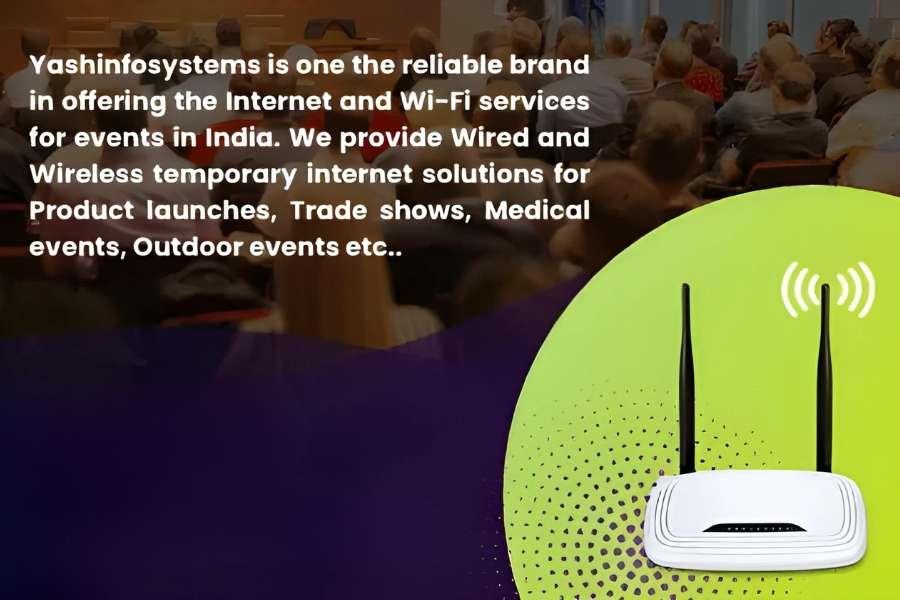A COMPREHENSIVE GUIDE FOR EVENTS ORGANIZER ON INTERNET AND WI-FI REQUIREMENTS FOR EVENTS
Temporary internet is required for events for a number of reasons. First, in today’s digital age, attendees expect to have access to reliable internet to stay connected with their work, friends, and family. Second, event organizers often rely on internet connectivity to support a range of event activities such as live streaming, social media engagement, online registration, and other digital services. Without a reliable internet connection, these activities may not be possible, resulting in a less engaging and less successful event. Additionally, temporary internet can enable real-time data collection and analysis, which can provide valuable insights to event organizers and help them make informed decisions for future events.

Why Temporary Internet is required for Events?
Temporary internet is required for events for a number of reasons. First, in today’s digital age, attendees expect to have access to reliable internet to stay connected with their work, friends, and family. Second, event organizers often rely on internet connectivity to support a range of event activities such as live streaming, social media engagement, online registration, and other digital services. Without a reliable internet connection, these activities may not be possible, resulting in a less engaging and less successful event. Additionally, temporary internet can enable real-time data collection and analysis, which can provide valuable insights to event organizers and help them make informed decisions for future events.
As per the research, 9 out of 10 events will need some sort of bandwidth and WiFi service. Whether it’s a trade show, conference, fashion show, concert, product launch, or something else, there are thousands of uses for WiFi and Internet.
Things to consider for Temporary Internet setup for Events
Whenever you organize an event, you need to plan everything before ahead so that it will be not be a last minute call and event should run smoothly. In the planning it covers the Internet and Wi-Fi Setup also which will differ for each events.
Number of attendees
Know your audience size for determine the type of Wi-Fi best suited to your event. Even an educated estimate is useful, so prepared the check list of attendees and consider the number of devices they’re likely to bring.
For example, if 500 people will be attending your event, and it’s likely that the average person will bring around two devices (for example, a phone and a laptop) that will require Internet connectivity, you’ll need to arrange for a Wi-Fi solution that can support approximately 1,000 devices. Along with that you need to consider the requirement of internet for in-house team for the purpose of Live streaming , Video production, Event registration, Payment gateway etc..
Event type and location
Internet requirement differs based on the Venue and type of events, whether it is a outdoor musical show or a corporate meeting or a Product launch, based on this you can talk to Temporary Internet vendors requesting Internet access and discuss the needs of temporary internet and Wi-Fi for your events. They’ll use this information to determine how much bandwidth your event will require.
Bandwidth requirements
Estimate the expected internet usage per attendee based on the type of event. For example, for a conference, you can estimate that each attendee may need 1 Mbps of bandwidth to access online presentations, videos, and collaborate on documents.
Multiply the number of attendees by the estimated internet usage per attendee: Once you have estimated the internet usage per attendee, multiply it by the number of attendees to get the total bandwidth requirement for the event. For example, if you expect 500 attendees at a conference, and each attendee may need 1 Mbps of bandwidth, the total bandwidth requirement for the event would be 500 Mbps. It’s always a good idea to add a buffer of at least 20% to the estimated bandwidth requirement to ensure that the event runs smoothly even if the internet usage patterns are higher than expected.
Choosing the right Wi-Fi Vendor
Last but not the least, make sure to seek out the right Wi-Fi vendor for your needs. Professional network vendors can conduct a site survey and offer suggestions as to the kind of network and equipment you’ll need as well as the most effective access point layout for your event.
Any good event Wi-Fi provider uses equipment that can generate detailed reports. As an event organizer, it’s very valuable for you to know how many devices connected, how much bandwidth was utilized and how important your wireless network actually is. This data will allow you to make informed decisions to ensure that each of your events is better than the last.
Conclusion
We at EWI, proud to say that we have deployed many internet leased line and installed hundreds of optic fiber cables and made the events successful. We take a note of every small thing and make sure the proper installation, captive portal customization, and on-site support during the event with the help of Level 2 and Level 3 network engineers.
